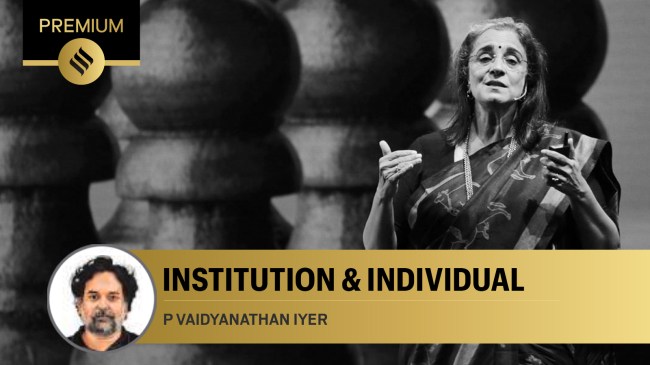Opinion Hindenburg revelations raise questions — Sebi and its chief Madhabi Puri Buch must answer
The confidence of common investors in the securities market rests squarely on Sebi’s professional competence and institutional credibility as much as it does on the integrity of the person helming the regulatory body
 Did Buch disclose her investment in the sub-fund of the foreign portfolio investor, to which a company set up by Vinod Adani also subscribed? (Express file photo by Pradip Das)
Did Buch disclose her investment in the sub-fund of the foreign portfolio investor, to which a company set up by Vinod Adani also subscribed? (Express file photo by Pradip Das) After M Damodaran took charge of the Unit Trust of India in 2001 following the historic US-64 fiasco in December 2000 (when sale and redemption of India’s first mutual fund Unit Scheme 64 launched by UTI in 1964 was suspended), he took a conscious call to sell the only equity holding he had — 50 shares of State Bank of India that he was allotted during its initial public offer in 1993. Back then, he didn’t have the heart to say no to a request by the manager of the local SBI branch where he held a savings bank account. There was nothing that UTI, the country’s first mutual fund set up by state-owned institutions, could conceivably have done that could be construed as a conflict of interest later on given Damodaran’s holding of a meagre 50 SBI shares. But he held himself to exacting standards of governance. The IAS officer of 1971 batch, Tripura cadre, went on to become the chairperson of the Securities and Exchange Board of India (Sebi) in February 2005.
The point of this anecdote, recalled by another former regulator, is that it is individuals who make institutions when they lead; and it is also true that, at times, the institution shapes the character of the person occupying its highest seat. The latest revelations by US-headquartered Hindenburg Research on the investments by Sebi Chairperson Madhabi Puri Buch and her husband Dhaval Buch in a certain global offshore fund linked to the Adani Group puts to test the balance between institutional autonomy and accountability that such positions demand. The market regulator’s advice that “investors should remain calm and exercise due diligence before acting on such reports” sounds more like a Sebi order dictated by the Sebi chief. It could have been more convincing if it had addressed the many questions that the Hindenburg revelations have raised.
These questions are: Did Buch disclose her investment in the sub-fund of the foreign portfolio investor, to which a company set up by Vinod Adani also subscribed? What did she do when the Adani Group investigation first came to her table, when she was a whole-time director and later as chairperson? Did she offer to recuse herself when there were allegations relating to other investors in this sub-account? Did she tell the board or the court that the ambit of the probe that Sebi had been asked to conduct covered the period when she and her husband were involved in an investment transaction that had a dotted line link to Vinod Adani?
The confidence of common investors in the securities market rests squarely on Sebi’s professional competence and institutional credibility as much as it does on the integrity of the person helming the regulatory body. And the regulator must not only be of impeccable integrity but also be seen to be above board.
Hindenburg, which claims to specialise in forensic financial research, says on its site that it looks for “man-made disasters floating around in the market”. Of course, it doesn’t say that in these disasters, it smells profit-making opportunities by selling short. In short selling, a trader, who believes stock prices will fall, makes money by selling shares at higher prices, and then buying them back at lower prices. Eighteen months back, in January 2023, Hindenburg had kicked up a political storm by accusing the Adani Group of brazen stock market manipulation and accounting fraud. In this, it admitted it had short positions on Adani. Its August 10 report seems like a Part 2.
Interestingly, the company chose its name after a disaster in 1937 when a huge German passenger airship LZ 129 Hindenburg, was destroyed by fire. The disaster was in the making since the makers had decided to use a lighter but highly flammable gas hydrogen, instead of helium, to lift the airship. But the image of it bursting into flames, and killing almost a hundred, shattered the world’s confidence in airships. Borrowing from this literature, a particular price movement pattern of stocks called the “Hindenburg omen” presages a market crash, and hence presents an opportunity for short selling — what Hindenburg did in January 2023.
Now, the revelations have put the onus on the market regulator to clear the haze around allegations of market manipulation by the Adani Group, which the latter has consistently maintained are baseless. Buch, who had joined Sebi as a whole-time director in 2017 and was appointed its chairperson in March 2022, had at least two clear opportunities to make disclosures about her and her husband’s investments in the Adani-related offshore fund. The need to make this disclosure is seen to be critical by many in the regulatory circles because this is unlike a Systematic Investment Plan in a mutual fund which a common person puts her money in. Investments in offshore funds by high net worth individuals (HNIs) are managed by portfolio managers. In a normal mutual fund, an investor has zero say in how her money is invested by the fund manager. In most Portfolio Management Schemes, the HNI has greater interaction with the portfolio fund manager and more knowledge about the investment. This then begs a question: Did she and her husband have “constructive knowledge” about the deployment of funds?
To whom could she have disclosed this? First, to the Supreme Court. Would the Court have dismissed a plea to set up a court-monitored team to probe the allegations against the Adani Group, if it had knowledge about the Sebi chief’s conflict of interest? Would it not have asked Sebi or the government to recuse her from the investigation to ascertain the real economic ownership of 13 overseas entities — which the regulator has been struggling to find out since October 2020?
Second, to the six-member expert committee set up by the SC in March 2023. This committee with members, including KV Kamath, Nandan Nilekani and OP Bhatt, was set up to examine if there was regulatory failure in dealing with the alleged contravention of laws pertaining to the securities market in relation with the Adani Group or other companies. If she did make this disclosure to the committee, it was incumbent upon it to inform the Supreme Court.
A voluntary disclosure about investments to the Sebi board alone may not suffice when it comes to the head of a market regulator. Yes, telling the board, in one way, means keeping the government informed, since at least two Government of India secretaries and an RBI nominee sit on the board of the regulator. The government, for all practical purposes, would be seen as having all information. Before looking for a foreign hand and a conspiracy to undermine Indian institutions, maybe these three should also look within.



